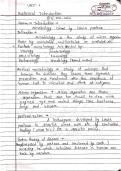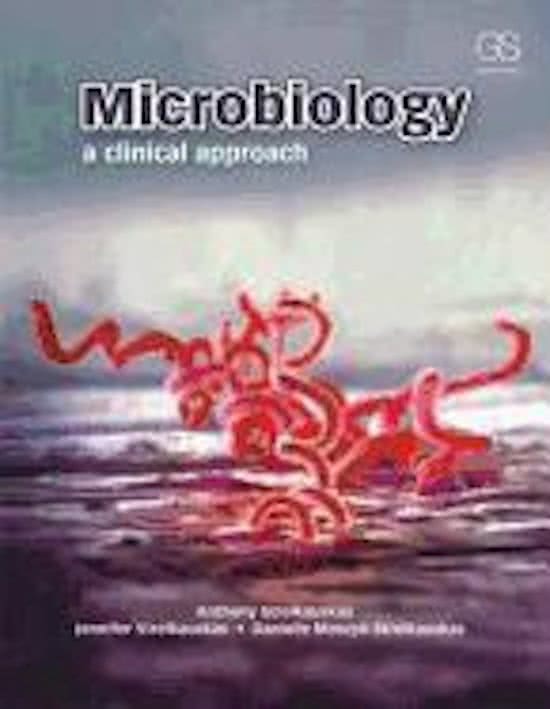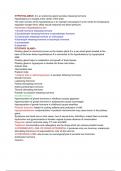Xeeyaa
On this page, you find all documents, package deals, and flashcards offered by seller xeeyaa.
- 12
- 0
- 1
Community
- Followers
- Following
13 items

Cell structure with diagram
The cell, the basic unit of life, is a complex microscopic structure. Enclosed by a membrane, cells house genetic material and organelles, orchestrating vital functions. In eukaryotes, like humans, cells boast a nucleus, while prokaryotes lack one. Cellular processes, such as mitosis and meiosis, drive growth and reproduction. Cells communicate through chemical signals, ensuring coordination. Specialized cells form tissues, contributing to organs and systems. Cellular diversity enables distinct ...
- Interview
- • 3 pages •
-
• Science
The cell, the basic unit of life, is a complex microscopic structure. Enclosed by a membrane, cells house genetic material and organelles, orchestrating vital functions. In eukaryotes, like humans, cells boast a nucleus, while prokaryotes lack one. Cellular processes, such as mitosis and meiosis, drive growth and reproduction. Cells communicate through chemical signals, ensuring coordination. Specialized cells form tissues, contributing to organs and systems. Cellular diversity enables distinct ...

Urinary system for 10th standard
The urinary system, crucial for maintaining homeostasis, comprises the kidneys, ureters, bladder, and urethra. Kidneys filter blood, removing waste and excess fluids, producing urine. Ureters transport urine from kidneys to the bladder, a muscular sac that stores urine until elimination. The urethra conducts urine from the bladder out of the body. Renal functions include regulating electrolytes, blood pressure, and red blood cell production. Disorders such as kidney stones, infections, or renal ...
- Interview
- • 3 pages •
-
• Biology
The urinary system, crucial for maintaining homeostasis, comprises the kidneys, ureters, bladder, and urethra. Kidneys filter blood, removing waste and excess fluids, producing urine. Ureters transport urine from kidneys to the bladder, a muscular sac that stores urine until elimination. The urethra conducts urine from the bladder out of the body. Renal functions include regulating electrolytes, blood pressure, and red blood cell production. Disorders such as kidney stones, infections, or renal ...

Cardio vascular system with diagram
The heart, a vital organ, pumps blood throughout the body, sustaining life. Composed of four chambers, it orchestrates a rhythmic dance of contraction and relaxation, maintaining a delicate balance. Oxygen-rich blood from the lungs enters the left atrium, then moves to the left ventricle, ready to be propelled into the systemic circulation. Simultaneously, deoxygenated blood returns to the right atrium, passes through the right ventricle, and embarks on a journey to the lungs for oxygenation. Th...
- Interview
- • 3 pages •
-
• Science
The heart, a vital organ, pumps blood throughout the body, sustaining life. Composed of four chambers, it orchestrates a rhythmic dance of contraction and relaxation, maintaining a delicate balance. Oxygen-rich blood from the lungs enters the left atrium, then moves to the left ventricle, ready to be propelled into the systemic circulation. Simultaneously, deoxygenated blood returns to the right atrium, passes through the right ventricle, and embarks on a journey to the lungs for oxygenation. Th...

Digestive system with diagram for 10th standard
The digestive system is a complex network of organs and processes that break down food into nutrients for the body. It begins in the mouth, where chewing and saliva start the digestion of carbohydrates. The food then travels through the esophagus to the stomach, where gastric juices break down proteins. Next, the partially digested food enters the small intestine, where enzymes further break down nutrients for absorption. The absorbed nutrients pass into the bloodstream and are transported to ce...
- Interview
- • 3 pages •
-
• Science
The digestive system is a complex network of organs and processes that break down food into nutrients for the body. It begins in the mouth, where chewing and saliva start the digestion of carbohydrates. The food then travels through the esophagus to the stomach, where gastric juices break down proteins. Next, the partially digested food enters the small intestine, where enzymes further break down nutrients for absorption. The absorbed nutrients pass into the bloodstream and are transported to ce...

Respiratory system with diagram for 10th standard
The respiratory system facilitates the exchange of gases, primarily oxygen and carbon dioxide, essential for cellular function. It comprises the upper and lower respiratory tracts. Air enters through the nose or mouth, travels down the trachea, and branches into bronchi, reaching the lungs' alveoli where gas exchange occurs. Oxygen binds to hemoglobin in red blood cells, while carbon dioxide is expelled during exhalation. The diaphragm and intercostal muscles aid breathing. Respiratory illnesse...
- Interview
- • 3 pages •
-
• Science
The respiratory system facilitates the exchange of gases, primarily oxygen and carbon dioxide, essential for cellular function. It comprises the upper and lower respiratory tracts. Air enters through the nose or mouth, travels down the trachea, and branches into bronchi, reaching the lungs' alveoli where gas exchange occurs. Oxygen binds to hemoglobin in red blood cells, while carbon dioxide is expelled during exhalation. The diaphragm and intercostal muscles aid breathing. Respiratory illnesse...

Lesions and it's treatment
Lesions refer to abnormal changes in tissues or organs, often resulting from injury, disease, or infection. These alterations can manifest visually or disrupt normal functioning. In medicine, lesions are crucial diagnostic indicators, aiding in the identification and understanding of various conditions. They can occur in organs like the brain, skin, or internal organs, each presenting distinct characteristics. Lesions may be benign or malignant, necessitating medical attention for proper evaluat...
- Presentation
- • 1 pages •
Lesions refer to abnormal changes in tissues or organs, often resulting from injury, disease, or infection. These alterations can manifest visually or disrupt normal functioning. In medicine, lesions are crucial diagnostic indicators, aiding in the identification and understanding of various conditions. They can occur in organs like the brain, skin, or internal organs, each presenting distinct characteristics. Lesions may be benign or malignant, necessitating medical attention for proper evaluat...

Gnm ist year papers 2023
Microbiology is the study of microorganisms, including bacteria, viruses, fungi, and protozoa. These tiny entities play crucial roles in various ecosystems, influencing human health, agriculture, and environmental processes. Microbiologists explore microbial structure, function, genetics, and interactions. The field has led to groundbreaking discoveries such as antibiotics, vaccines, and biotechnological applications. Microbes are both friends and foes, contributing to digestion, nutrient cyclin...
- Exam (elaborations)
- • 19 pages •
Microbiology is the study of microorganisms, including bacteria, viruses, fungi, and protozoa. These tiny entities play crucial roles in various ecosystems, influencing human health, agriculture, and environmental processes. Microbiologists explore microbial structure, function, genetics, and interactions. The field has led to groundbreaking discoveries such as antibiotics, vaccines, and biotechnological applications. Microbes are both friends and foes, contributing to digestion, nutrient cyclin...


Complete microbiology notes
Microbiology is the study of microorganisms, including bacteria, viruses, fungi, and protozoa. These tiny entities play crucial roles in various ecosystems, influencing human health, agriculture, and environmental processes. Microbiologists explore microbial structure, function, genetics, and interactions. The field has led to groundbreaking discoveries such as antibiotics, vaccines, and biotechnological applications. Microbes are both friends and foes, contributing to digestion, nutrient cyclin...
- Book
- Class notes
- • 115 pages •
Microbiology is the study of microorganisms, including bacteria, viruses, fungi, and protozoa. These tiny entities play crucial roles in various ecosystems, influencing human health, agriculture, and environmental processes. Microbiologists explore microbial structure, function, genetics, and interactions. The field has led to groundbreaking discoveries such as antibiotics, vaccines, and biotechnological applications. Microbes are both friends and foes, contributing to digestion, nutrient cyclin...

Medical science
The Medical Notes Package is a comprehensive and user-friendly software designed to streamline and enhance the process of medical documentation within healthcare facilities. This robust package integrates cutting-edge technology to provide healthcare professionals with a reliable and efficient tool for recording, managing, and retrieving
- Package deal
- • 4 items •
- Class notes 33345 (Zee12345) • Class notes
- Easy for clotting factors • Other
- Skelton system easy and worthy for examination • Class notes
- Endocrine system • Class notes
The Medical Notes Package is a comprehensive and user-friendly software designed to streamline and enhance the process of medical documentation within healthcare facilities. This robust package integrates cutting-edge technology to provide healthcare professionals with a reliable and efficient tool for recording, managing, and retrieving

Endocrine system
The endocrine system is a complex network of glands that produce and release hormones, serving as the body's chemical messengers. These hormones regulate various physiological processes, including metabolism, growth, and reproduction. Major glands, such as the pituitary, thyroid, and adrenal glands, work in harmony to maintain homeostasis. The endocrine system communicates with other systems, like the nervous system, to coordinate bodily functions. Hormones travel through the bloodstream, bindi...
- Book & Paket-Deal
- Class notes
- • 4 pages •
The endocrine system is a complex network of glands that produce and release hormones, serving as the body's chemical messengers. These hormones regulate various physiological processes, including metabolism, growth, and reproduction. Major glands, such as the pituitary, thyroid, and adrenal glands, work in harmony to maintain homeostasis. The endocrine system communicates with other systems, like the nervous system, to coordinate bodily functions. Hormones travel through the bloodstream, bindi...
